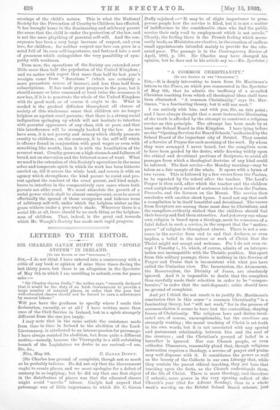LETTERS TO THE EDITOR.
SIR CHARLES GAVAN DUFFY ON THE " SPOILS SYSTEM" IN IRELAND.
[To TOE EDITOR OE THE "BrEaTATon."]
SIR,—I do not think I have entered into a controversy with a critic of any book or opinion of mine three times during the last thirty years, bat there is an allegation in the Spectator
of May 6th to which I am unwilling to submit, even for peace sake :—
" Sir Charles Gavan Duffy," the writer says," recently declared that it would be the duty of an Irish Government to provide a large number of salaried places, in order that the poor but well-educated classes should not be forced to earn .a subsistence by manual labour."
Will you have the goodness to specify where I made this declaration, recently, or at all P I have written more than once of the Civil Service in Ireland, but in a spirit strangely different from the one you imply.
I may note that in the same article the resistance made from time to time in Ireland to the abolition of the Lord- Lieutenancy, is attributed to an intense passion for patronage. I have always resisted its abolition, but from quite a different motive,—namely, because the 'Viceroyalty is a still subsisting branch of the Legislature we desire to see revived.—I am, Sir, &c.,
[Sir Charles has ground of complaint, though not so much as he probably believes. He did not say that the Government ought to create places, and we must apologise for a defect of memory in so implying; but he did say that one first object in the distribution of places was that the educated classes might avoid " servile " labour. Carlyle had argued that patronage was of little importance, to which Sir C. Gavan
Duffy rejoined :—" It may be of slight importance to pros- perous people how the service is filled, but it is not a matter of indifference to the considerable class who find the public service their only road to employment which is not servile.' Clearly, the feeling there is the French feeling which neces- sarily leads, as Ministries are elective, to the creation of endless small appointments intended mainly to provide for the edu- cated poor. The passage is in the Contemporary Review of April, 1892, p. 580. Sir Charles may have changed his opinion, but he does not in his article say so.—En, Spectatord


































 Previous page
Previous page